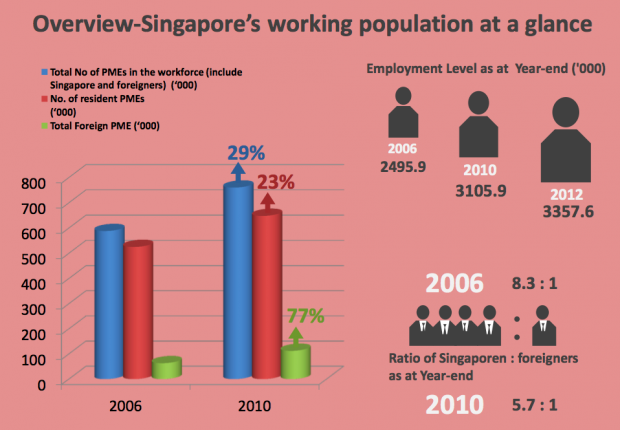Will Fair Consideration Framework create better jobs in Singapore?
By See Wee Heng1st August 2014 is an important date for all Singaporeans who are earning their keep in our small nation's highly competitive labour market.
Recently, the Ministry of Manpower (MOM) announced the Fair Consideration Framework (FCF) that will be launched 1st August 2014, where firms that want to hire foreigners on Employment Pass (EP) will have to prove that they have given fair consideration to Singaporeans.
Why Was The Fair Consideration Framework Created?
In recent years, Singapore has seen a huge influx of foreign talents. Statistics has shown that there was a 77% increase in foreign PMEs population from 2006 to 2010 although there was a relatively small 29% increase in total PME workforce in our labour market.
Numerous stories of local PMETs (professionals, managers, executives, technicians) being replaced by foreigners are increasingly spread like wild fire on the internet, and claims of cronyism and preferential hiring of fellow countrymen have stoked the embers of xenophobia in our otherwise multicultural island. Some of these claims are not totally unfounded. The prevalence of foreign PMEs in the banking and information technology sectors is hard to hide under the carpet.
With increased calls since 2011 for Labour Market Testing by NTUC to give locals a fair chance at jobs before hiring a foreigner, MOM finally addressed this issue with the Fair Consideration Framework.
3 Key Aspects of the Fair Consideration Framework
1. Consider Singaporeans Fairly & Improve Job Match
All companies will have to advertise for Singaporeans for at least 14 days in a National Jobs Bankthat is administered by the Singapore Workforce Development Agency (WDA). Firms with fewer than 25 staff, or job openings that pay $12,000 or more are excluded, but will still be subject to the Fair Consideration Framework.
The content of the advertisement must be open to Singaporeans and comply with the Tripartite Guidelines on Fair Employment Practices (TAFEP). Firms are to consider Singaporeans fairly for jobs, based on merit.
2. Added Scrutiny Against Discriminatory HR Practices
Firms who fail to comply with the new requirements or have a disproportionately low concentration of Singaporeans at the Professional, Managers & Executive (PME) level will be identified and put under greater scrutiny to improve their hiring and career development practices.
Unresponsive firms may suffer from a longer review period for their EP applications and may also have their work pass privileges curtailed.
3. Enhanced EP Qualifying Requirements
The qualifying salary for new EP applications will be raised from $3,000 to $3,300 from January 2014 to make it more expensive for firms to hire foreign talent.
Mr Wee Soon Guan, General Secretary of Singapore Bank Officers' Association (SBOA) hopes these changes will create a more level-playing field for Singaporean PMEs especially in the banking and finance industry where there seems to be a higher proportion of foreign PMEs.
Rogue Hirers May Game The System
Although the Fair Consideration Framework is an encouraging start, there lies a valid concern that rogue hirers will creatively seek out loopholes to manipulate the well-intended framework to their advantage.
For example, such companies can simply craft an unappealing remuneration and benefits package in their job description or stringent job requirement to deter Singaporeans from applying and hence justifying why the firm needs to bring in foreigners for the job. Once the foreign talent is hired, these companies can just make amendments to the job remuneration, benefits and requirements by pointing it to a ‘change of management’ direction.
Furthermore, the hiring process is rather subjective. The rogue hirer may put on a show of interviewing a number of Singaporean applicants over the stipulated 14 days and eventually select none from the pool. It is easy to cook up reasons such as there is no suitable fit with the company culture or lack of suitable “experience”.
The above are just the tip of the iceberg. We will not know what other tricks these rogue hirers have on their sleeves. However, the second key aspect of added scrutiny against discriminatory HR practices is meant to address this concern.
Singapore Still Open To Foreign Talents
Mr Tan Chuan-Jin, Acting Minister for Manpower, said, “Singapore has and will remain open to skills and workers from overseas. This has benefited Singaporeans because it allows firms to set up and create jobs in Singapore. But this must not come at the expense of fair HR practices. For Singaporeans to continue to benefit from economic growth, employers must consider Singaporeans fairly not only when hiring but also for career development opportunities. For example, our younger PMEs should be given the guidance and exposure that they need to develop.”
He added that if firms are unable to find suitable Singaporeans, they will still be able to hire and bring in the skills they need from overseas in order to build a strong team in Singapore of both local and foreign workers.
Mr Lim Swee Say, Secretary-General of NTUC, said that the new Fair Consideration Framework must strike a balance between ensuring local professionals are given an equal chance to progress, while continuing to attract foreign talent.
Concerns About Fair Consideration Framework
As much as I applaud the introduction of the Fair Consideration Framework, I am disappointed with the 1 year delay in the implementation of the National Jobs Bank. The buffer time may allow rogue hirers more time to pick out possible loopholes to game the framework or go on a hiring spree.
I am also curious why small firms with 25 or fewer employees are excluded from advertising in the National Jobs Bank. Will we potentially be looking at the emergence of many small firms budding off from previous departments of a larger organisation just for foreign talents to 'enjoy' this sanctuary?
With the introduction of the Fair Consideration Framework, little is shared on the actual enforcement process. I am interested to know details on how checks on firms and recruiters will be conducted, and the employment standards that firms will be judged against (to be defined as compliant/non-compliant).
Four Hopes for Fair Consideration Framework
1. Review pool of existing employees, not just future hires.
For example, if the firm has a disproportionately low concentration of Singaporeans at the PME level, the firm will need to increase the Singaporean ratio by letting go of foreign talents whose positions can be replaced by Singaporeans who have the necessary skills and expertise.
2. Scale up Singaporean workers’ skills and expertise.
Upon identifying sectors which Singaporeans are lacking in relevant skills and expertise, Continuing Education and Training (CET) campuses such as the new e2i campus can address these jobs-skills mismatch with better targeted courses to make Singaporeans more relevant to employers.
3. Look for synergies between local and foreign talents.
Instead of hiring foreign talents straight away to fill up a permanent position, foreign talents may be engaged as temporary consultants to scale up the required skill sets to local Singaporeans first.
In the long run, we should be looking at enriching and enhancing the capabilities of the local workforce, rather than adopting the short-sighted practice of hiring foreign talents to fill in the gaps with no concrete plan for skills or knowledge transfer to Singaporeans.
4. Mindset Changes For Both Employers & Singaporeans.
This works two ways.
- With fair consideration given to Singaporeans, employers may just find that there are suitable local workers after all.
- With better opportunities for job placement and training courses tailored to solve jobs-skills mismatch, I hope Singaporean workers will have more self-confidence to step up and claim a more empowered ownership of the future of their country.
We have just started our first step to better jobs for Singaporeans. Let's not stop here. We can and we should push further.



























 Advertise
Advertise






